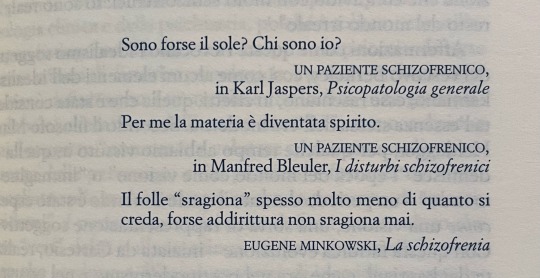#karl jaspers
Text
Die Menschheit zur Freiheit bringen, das heißt, sie zum Miteinander reden bringen.
To bring freedom to mankind means to get them to talk to each other.
Karl Jaspers (1883 – 1969), German psychiatrist and philosopher
20 notes
·
View notes
Text

24 notes
·
View notes
Photo

Karl Jaspers, General Psychopathology
65 notes
·
View notes
Text
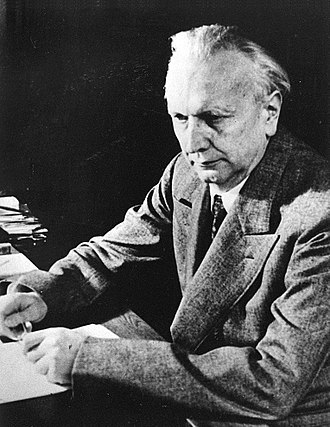
«Hay culpa moral en todos aquéllos que dejan espacio a la conciencia y al arrepentimiento. Son moralmente culpables las personas capaces de expiación, aquéllos que supieron o pudieron saber y que, sin embargo, recorrieron caminos que ahora, en el autoexamen, estiman como un error culpable, tanto si se encubrieron cómodamente lo que sucedía o se adormecieron y se dejaron seducir o comprar para obtener ventajas personales cuanto si obedecieron por miedo.»
Karl Jaspers: El problema de la culpa: Sobre la responsabilidad política de Alemania. Ediciones Paidós, pág. 82. Barcelona, 1998.
TGO
@bocadosdefilosofia
#jaspers#karl jaspers#el problema de la culpa#sobre la responsabilidad política de alemania#culpa#culpa moral#ética#moral#nazismo#conciencia#arrepentimiento#responsabilidad#miedo#error#error culpable#culpabilidad#autoexamen#existencialismo#expiación#teo gómez otero
16 notes
·
View notes
Text
L’aspetto improvviso di questi giorni, esteriormente del tutto privi di eventi [...] l’incedere forte, non già sentimentale, con cui l’amicizia è giunta a noi, la consapevolezza crescente di una comunità di lotta, sempre sicura di sé da entrambe le ’parti’ - tutto ciò mi occupa la mente in maniera inquietante, come possono essere inquietanti per il filosofo il mondo e la vita.
Martin Heidegger a Karl Jaspers
10 notes
·
View notes
Text
«نتقلب بين العيش على ضياء حيويتنا، و بين ألم انكماشه.»
Karl Jaspers — General Psychopathology
89 notes
·
View notes
Text

“Life is illusion, disillusionment is destruction.”
Karl Jaspers, Tragedy is not enough, 1952
5 notes
·
View notes
Text
Ad un certo punto della discussione sull’era atomica, parliamo del 1957, appare il libro di Karl Jaspers, Die Atombombe und die Zukunft des Menschen. Günther Anders si trovava in Giappone per una serie di iniziative contro la proliferazione degli armamenti nucleari. A stretto contatto con le vittime. Quell’esperienza è raccontata in Essere o non essere. Diario di Hiroshima e Nagasaki. In Italia fu pubblicata da Einaudi nel 1961 con la prefazione di Norberto Bobbio. Anders non accetta la posizione di Jaspers, dalla quale emergerebbe la possibilità che in date circostanze la guerra nucleare possa essere interpretata come un sacrificio moralmente accettabile. Anders si chiede: chi si dovrebbe sacrificare, a chi e chi sacrificherebbe. In caso di guerra nucleare è l’umanità ad essere sacrificata, da parte di un potere che da lei stessa promana e che diventerebbe lui stesso il dio esigente che impone a tutti l’estinzione per uno soprassalto insensato della propria volontà. Le osservazioni di Anders stigmatizzano un concetto, quello di sacrificio, in quel contesto, senza alcun senso, essendo infatti privo “di un dio a cui si sacrifica, che esige il dono, che lo accoglie e a cui esso è gradito”.
Disperazione piena per un sacrificio senza dativo – non c’è più dio – un sacrificio in bianco. “Com’era innocua [la religiosità vaga e intransitiva dei vecchi secolarizzati] di fronte a questa forma estrema e paurosa di secolarizzazione, la loro fede in bianco!”. Jaspers, forse senza rendersene del tutto conto, restituiva legittimità al sacrificio richiesto dal mondo delle idee, degli ideali politici, della concettualità proliferante dei sostituti di Dio, o degli stessi dèi pretenziosi di un paganesimo che si rinnovava nella forma della potenza economica egemonica di una forma di vita, quella occidentale.
6 notes
·
View notes
Text
This is the vision of a great and noble life: to endure ambiguity in the movement of truth and to make light shine through it; to stand fast in uncertainty; to prove capable of unlimited love and hope.
Karl Jaspers, Tragedy is not Enough: Jaspers wrote extensively on the threat to human freedom posed by modern science & modern economic & political institutions.
3 notes
·
View notes
Text
nerede bulunursanız bulunun zaman yaşanmaz olacaktır kısa sürede.
nereye gideceksiniz bunu bildiğinize göre?
emil cioran - parçalanma
#emil cioran#parçalanma#çürümenin kitabı#gözyaşları ve azizler#terry eagleton#hayatın anlamı#bilge karasu#karl jaspers#franz kafka#dönüşüm#oblomov#dostoyevski#lucius annaeus seneca#stoic philosophy#stoa felsefesi#antik yunan#sokrates#platon#friedrich nietzsche#böyle buyurdu zerdüşt#felsefe blog#felsefe#milan kundera#varolmanın dayanılmaz hafifliği#albert camus#bulantı#yabancı#sisifos söyleni#ahmet altan#blogger
19 notes
·
View notes
Text
‘It can be considered as a sad disaster, that no philosophy, no religion, no ideology, lead to a peaceful and healthy world.’
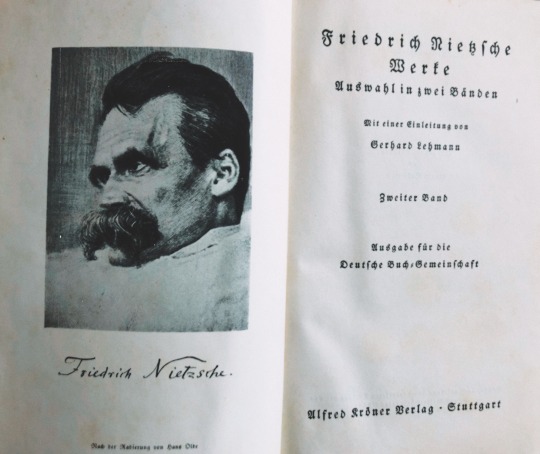

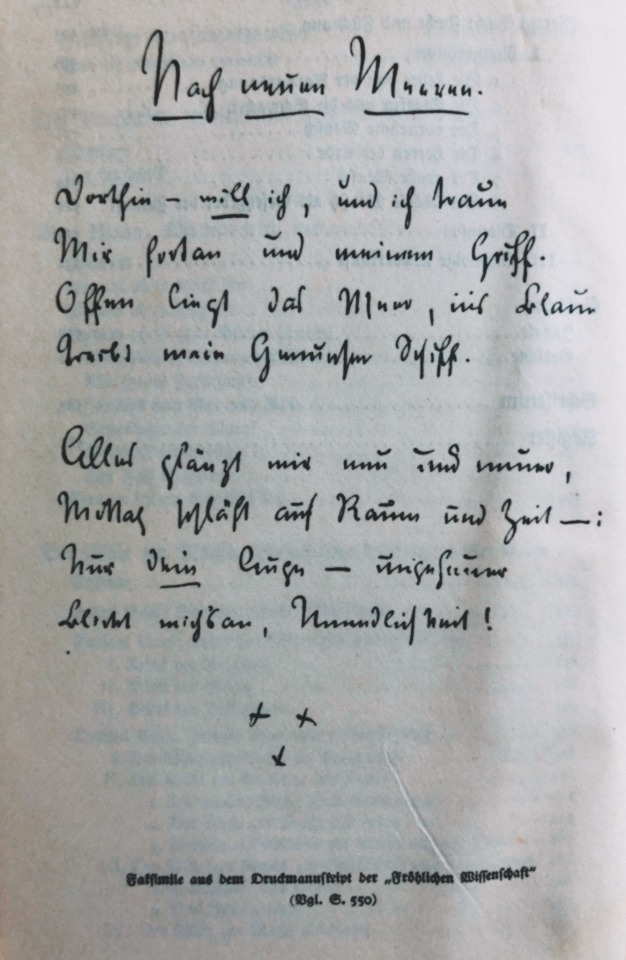
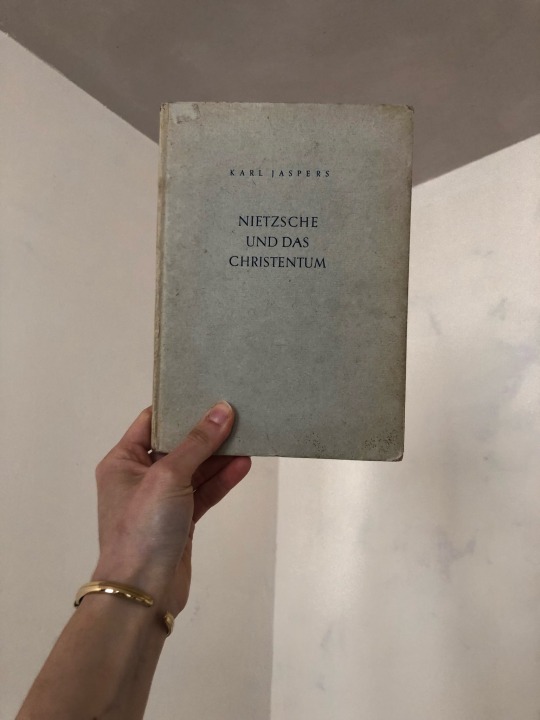
"Nietzsche and his Christian Worldview“ is presented by Karl Jaspers in 1938 (a lecture in the context of Wissenschaftlicher Predigerverein Hannover), who was pen pal of Hannah Arendt and mental Student of Max Weber.
The other book is a collection of selected writings of Nietzsche, also published in 1938.
Both not of antiquarian value, but can be used as credentials to underdraw the failure of all promises of salvation.
'In truth,there was only one Christian and he died on the cross.'
Every try to draw near to Nietzsche‘s philosophy and opinion, will stay insufficient. For understanding Nietzsche it is obligatory to understand his contradiction, to understand the discrepancy as a pretence-function.
The 'completeness' of his philosophical claim, can just be expressed in this way of antinomy: Between drastic apodictic claims and endless dialectic of all abolishing possibilities.

Nietzsche also saws his current epoch in a crisis.
The sinking of culture
The replacement of education by merely knowing about education
The permanent search for ways to compensate the mental loss of substance („seelischer Substanzverlust“)
Universal acting and Living in the 'as if' (das Leben im „als ob“)
The anaestesia of boredom by rush and sensation
[…]
and in the noise of mind-simulation, everything is talking, all is ignored and missed by non-existent listeners, all is 'over discussed'
to the point of losing importance and significance.
And in the dullness of breathless acquisition, in the clamour of the masses, which are feeding the machinery that will in the end consume them, nobody is noticing the big event:
God is dead.
This phrase was too often miscontrusted as godlessness, it has to be seen more as an ontological perception of human existence in so called modern world.
Why is God dead? Should be the next question and Nietzsche would answer:
Because of Christianity.
In Nietzsche’s world-view, the interaction of Christian values and methods to 'overcome' the lies and hypocrisy are not to underestimate.
As Nietzsche himself had both parents descend from pastor families, he explains the distance from Christian Religion, especially the inner scepticism of German protestants, by the fact that they have lost their believe as they noticed the errors of what was preached and what was put into practrice.
But Nietzsche’s hostility is not holistically integrated into his basic experience, as he is using Christian value system for his theory of world-history:
The Universality, Unity, Coherence, Will for Truth (as a Symbol between Logos and Alogon, here the antinomy again) and the Christian Propulsion as the energy for break with all the falseness,
because the deeply relfected thinker reveals this fanatism of rigid adherence on a world-immance of the One, that does not exist.
The reflected person, educates himself and is willingly disturbing the sure thought being.
With his restless thoughts, that will not give him comfort in determination, because the human will percieve a higher essence of being in „Nicht-Festgestelltheit“ (~ Not-Determinedness)
The Human will be alone, but he will reach new highs without a goddess, all beauty and all knowledge will be brought back to him, to us (auf-uns-Selbst-zurückrufen), he himself will be brought back into himself.
Out of the deepness of historicity of humanity, there will be fullfilled freedoms, because he will be the present, brought back into himself (sich-Selbst-geschenkt-werden).
Not only for Nietzsche is the distortion of Christianity, the reverse of what was true for Jesus.
It is generally underrated how Nietzsche is drawing an Image of Jesus, to exhibit defects of what the Christian Religion did with the ethical rules of behaviour Jesus exemplified.
„Im Grunde hab es nur einen Christen und der starb am Kreuz.“
Whereas Jesus embodied the ressentiment (of all Humiliated and Insulted, the resentement of the Powerless, the decandence of those, who will ruin themselves „Sich-Selbst-zu-Grunde-richten“),
the later Interpretation reduced the Symbol of a new humanistic ethic into faith.
Faith turned into doctrine and the symbol 'anouncement of the infinite bliss' was decreased into „lauter Sachen und Personen, statt der Symbole, lauter Riten und Dogmen, statt einer Praxis des Lebens.“
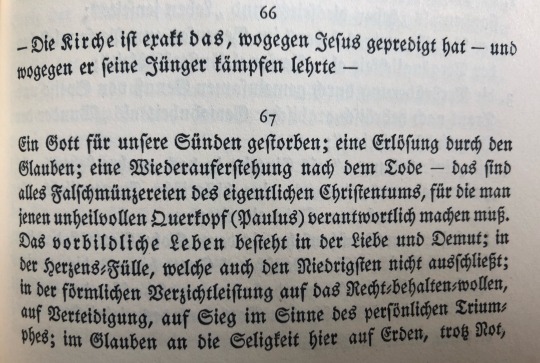
With Paulus impact Jesus was turned to the figure of the saviour, in the foreground the crucifixion and resurrection of Christ. And because the disciples of Jesus searched for an Explanation, because earthly Born can not bear the bottomless and the inexplicable, they searched for ways for atoning the crime, a method for expiating the sin, so they asked how could have this [injustice] happen?
It has to happen this way, God gave his son as a sacrifice for our sins.
„Nichts ist unchristlicher als die kirchlichen Kruditäten von der Gott als Person, von einem Reich Gottes, welcher kommt von einem Himmelsreich, jenseits, von einem ‚Sohn Gottes‘, der zweiten Person der Trinität … Das ist alles im welthistorischen Zynismus die Verhöhnung des Symbols.“
Nietzsche situates the destructive lie in Christianity, that made the Ancient Greek wisdom in vain, destroyed the Imperium Romanum, annihilated the progess of Islam scholarship and wisdom, the progress and humanistic ideas of the Renaissance and is till today blurring the striving of the individual to forefeel the truth, because the Christian demand on historical Totalwissen is paralyzing by tracing the Golden Age back to a long past time (ironically Nietzsche also, as he is proclaiming the historical highlight of humanity in pre-Socratic Greece, the up-lifting era of tragedy).
Nietzsche wants to establish a new philosophy, a countermovement, the nihilism for washing the humanity pure from all the attached and purported sins and fictions.
Following the esperance to give the human an higher self by finding himself, without searching for himself, by drawing near to truth, without fixing and degenerating it.
And Nietzsche is detecting, like other Übergangsmenschen, that science will also be instrumentalised and its content filled like previous dogmatic doctrines.
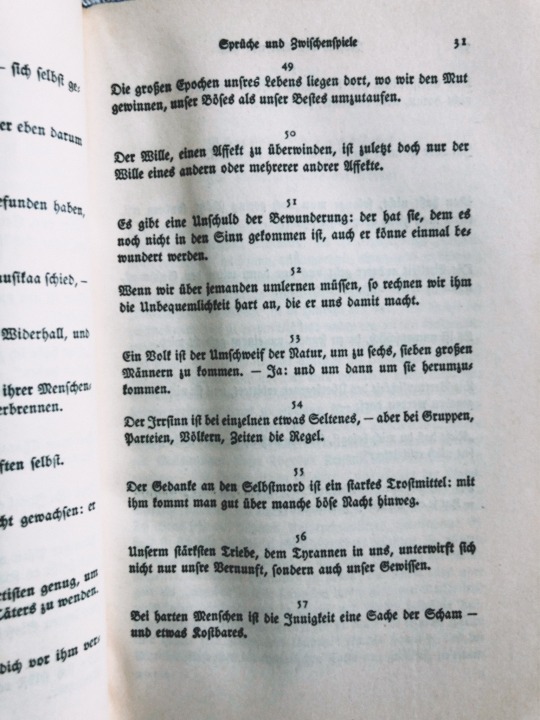
Now a personal train of thoughts:
It gives me a feeling of unease, when ´Modern world´ is praised and labelled with concepts, which lack more and more authorization in the practice.
When neo-liberal economy, military re-armament, increased importance of biopolitics, parliamentary reduction of jurisdiction, hypersensitization of (mental) diseases […] are considered as absolutely necessary for maintenance of democratic governmental system, a more or less reflecting human-being is seeking for a debate culture, a professional (and thereofore unbiased) exchange of interdisciplinary methods of analysis.
It will remain difficult to establish a criticial discourse, even till today propagandistic instruments are used for formation of opinion, not just in countries like China, Russia or Turkey, but also in countries we would consider as intented to ensure freedom of speech, as economic interests are dictating the course and purposely replacing fundamental ethical principles (war and aggression are always to condemn, every armed conflict is a sign of humaneness failure !!! )
The world of our humanity is still not able to find sustainable solutions for the majour issues (Global Climate Crisis; rising gap between rich and poor; imprudent consumerism; Extensive Surveillance & Big Data, just to name a few...) of our future.
It can be considered as a sad disaster, that no philosophy, no religion, no ideology, lead to a peaceful and healthy world.
It could be so easy, if basic maxims, would have born in fruit. If the `Golden Rule´, which can be traced back till Ancient Egypt and India, would have been truely assimilated into soul and heart.
`Thou shalt not kill‘, but still today, mothers lose their children and women become willows.
O- we have wonderful definitions of peace and harmony, we were endowed by evolution with this present called reason, to order and tame the forces of nature, to make our lives more and more comfortable.
Equal we are born, but the place of birth is separating us, no equal chances and opportunities to actively improve our way of living, pushing the envelope with sincere effort to the limit of our mental and physical flexibility.
Indisputable are also the systematical limitations, in the modern world, science will be exploited for politcal and economic concerns.
In a world, where 'God is Dead' , the seeking human can not find rest bottomless and abysmal, as long as he is not able to find home within himself.
It seems that science will constantly shoulder more and more responsibility and this development could improve prudent valuation and therefore a healthy basis for all live on earth.
But as science is the daughter of Philosophy, it must be reviewed and verified by Ethics Council (my Suggestion: Compiled by financial-independent international supervisory authorities of all areas of life and different vocational sectors, crossing all cultural and age-group section).
It will stay a dream, to imagine a world without wars and greed,
but if every single one could end the war within himself,
I think there would be no war outside the own body and mind.

'Error is something rare in individuals, but it is the rule in groups, parties, peoples, times.'
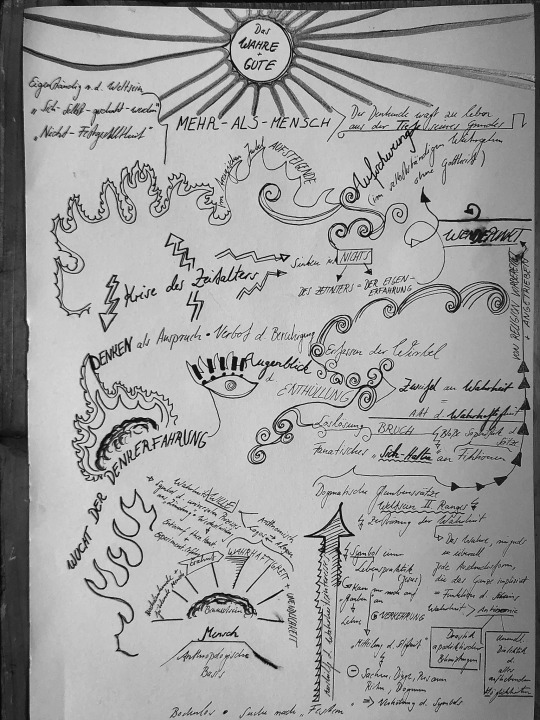
[Trying to fix a conception of how an individual can improve himself. No Completeness, very messy, here and there some teardrop disturbing the scripture !!! :') Never meet my own requirements :( ]
#Nietzsche#Friedrich Nietzsche#Zarathustra’s Monkey 🐒🥰#philosophy#thoughts#Menschwerdung#criticism against church#criticism against institutionalised religion#society critics#literature#book cover#bookworm#book#philosophical works#German philosopher#philologic#God is Dead#theodicy#Karl Jaspers#Hannah Arendt#Kritik
8 notes
·
View notes
Text
Die Menschheit zur Freiheit bringen, das heißt, sie zum Miteinander reden bringen.
Bringing mankind to freedom means making them talk to each other.
Karl Jaspers (1883 – 1969), German psychiatrist and philosopher
48 notes
·
View notes
Text

#philosophy#quotes#Karl Jaspers#General Psychopathology#Jaspers#conflict#people#society#progress#change
19 notes
·
View notes
Photo

From Karl Jaspers’s Way to Wisdom
16 notes
·
View notes
Text
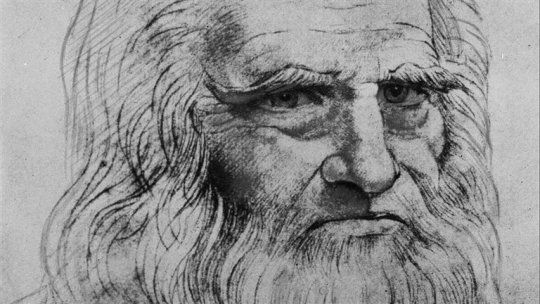
«Aquí el investigador, el técnico y el artista se unen. Y esa unidad no está condicionada por el predominio de ninguno de tales estados. No es la intención de Leonardo sino el interés de la posteridad lo que destaca una de esas formas, casi siempre la artística. Es por esta unidad que podemos calificar a Leonardo de filósofo, entendiendo la filosofía no como una disciplina científica, no como una doctrina, sino como un conocimiento universal de uno mismo que se hace consciente siguiendo una guía y, por tanto, como una forma vital de la existencia humana que encierra en sí misma el conocimiento.»
Karl Jaspers: Leonardo como filósofo, pág. 84. Editorial Sur. Buenos Aires, 1956
TGO
@bocadosdefilosofia
@dias-de-la-ira-1
#leonardo da vinci#jaspers#karl jaspers#leonardo como filósofo#renacimiento#técnica#ciencia#arte#filosofía#existencia#existencialismo#conocimiento universal#existencia humana#teo gómez otero#autorretrato
2 notes
·
View notes
